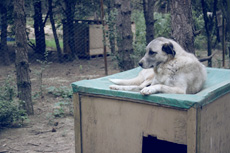


Neuter and Return
There are only 3 ways to solve stray dog problems:
- To kill or remove every single fertile bitch.
- To remove the food source, i.e. somehow prevent animal lovers feeding unsupervised dogs and remove all rubbish from the streets so that the dogs starve to death.
- Or "Neuter and Return".
Extermination campaigns, for example the indiscriminate poisoning or shooting of dogs at night irrespective of whether they are neutered and vaccinated or indeed pets with owners, have never succeeded anywhere in the world.
'Neuter and Return', the policy advocated by the World Health Organisation and the World Society for the Protection of Animals, solves the problem permanently, although dogs have to be tolerated on the streets for 5-8 years for it to succeed. Providing it is implemented to the edge of the urban area it is however a permanent and humane solution which politicians can be proud of.
"In the long term, control of reproduction is by far the most effective strategy of dog population management."
W.H.O., Geneva, Guidelines for Dog Population Management,
(page 72).
'Neuter and Return' must be implemented in conjunction with education campaigns to explain the importance of neutering, of vaccination and of preventing dogs from reproducing.
Turkey needs to invest money and effort now to solve the problem forever.
Stray dog populations anywhere depend solely on the amount of food available. Nature adjusts the population to the carrying capacity of the territory. If just one fertile female escapes being killed or captured she can breed up to 67,000 offspring in 6 years. That is why killing dogs can never succeed unless every single female is exterminated. That is why Turkish streets are still full of dogs.
If however the carrying capacity of an area is filled with sterile animals the population will gradually die out, providing no fertile dogs can infiltrate from surrounding areas and providing freshly abandoned dogs are collected by dog wardens, police and residents (as in developed countries).
"Removal and killing of dogs should never be considered as the most effective way of dealing with a problem of surplus dogs in the community: it has no effect whatsoever on the root cause of the problem." – Guidelines for Dog Population Management, W.H.O. Geneva 1990
(page 74)."In none of the study areas did the elimination of dogs by any method have any significant long term effect on dog population size." –Report of W.H.O. Consultation on Dog Ecology Studies related to Rabies Control, Geneva, 22-25 February 1988
(page 11).
To know more: please download the document Solution to Turkey's stray dog problem.

